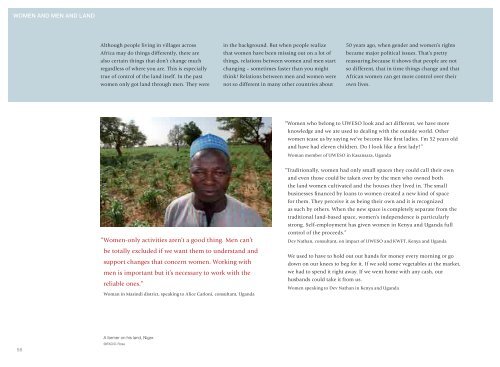You also want an ePaper? Increase the reach of your titles
YUMPU automatically turns print PDFs into web optimized ePapers that Google loves.
WOMEN AND MEN AND LAND<br />
Although people living in villages across<br />
Africa may do things differently, there are<br />
also certain things that don’t change much<br />
regardless of where you are. This is especially<br />
true of control of the land itself. In the past<br />
women only got land through men. They were<br />
in the background. But when people realize<br />
that women have been missing out on a lot of<br />
things, relations between women and men start<br />
changing – sometimes faster than you might<br />
think! Relations between men and women were<br />
not so different in many other countries about<br />
50 <strong>years</strong> ago, when gender and women’s rights<br />
became major political issues. That’s pretty<br />
reassuring,because it shows that people are not<br />
so different, that in time things change and that<br />
African women can get more control over their<br />
own lives.<br />
“Women who belong to UWESO look and act different, we have more<br />
knowledge and we are used to dealing with the outside world. Other<br />
women tease us by saying we’ve become like first ladies. I’m 52 <strong>years</strong> old<br />
and have had eleven children. Do I look like a first lady?”<br />
Woman member of UWESO in Kasansara, Uganda<br />
“Women-only activities aren’t a good thing. Men can’t<br />
be totally excluded if we want them to understand and<br />
support changes that concern women. Working with<br />
men is important but it’s necessary to work with the<br />
reliable ones.”<br />
Woman in Masindi district, speaking to Alice Carloni, consultant, Uganda<br />
“Traditionally, women had only small spaces they could call their own<br />
and even those could be taken over by the men who owned both<br />
the land women cultivated and the houses they lived in. The small<br />
businesses financed by loans to women created a new kind of space<br />
<strong>for</strong> them. They perceive it as being their own and it is recognized<br />
as such by others. When the new space is completely separate from the<br />
traditional land-based space, women’s independence is particularly<br />
strong. Self-employment has given women in Kenya and Uganda full<br />
control of the proceeds.”<br />
Dev Nathan, consultant, on impact of UWESO and KWFT, Kenya and Uganda<br />
We used to have to hold out our hands <strong>for</strong> money every morning or go<br />
down on our knees to beg <strong>for</strong> it. If we sold some vegetables at the market,<br />
we had to spend it right away. If we went home with any cash, our<br />
husbands could take it from us.<br />
Women speaking to Dev Nathan in Kenya and Uganda<br />
56<br />
A farmer on his land, Niger.<br />
©<strong>IFAD</strong>/D. Rose

















